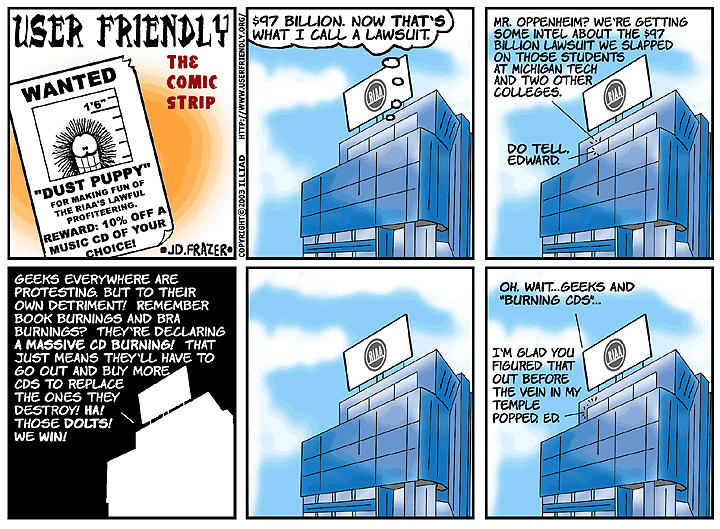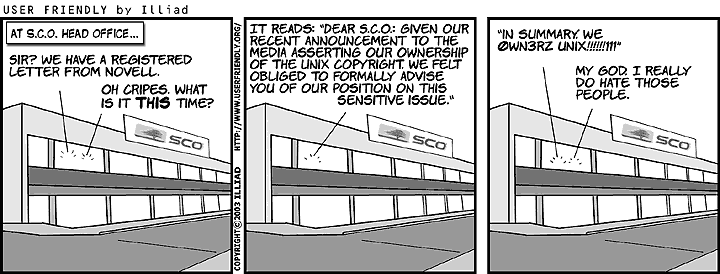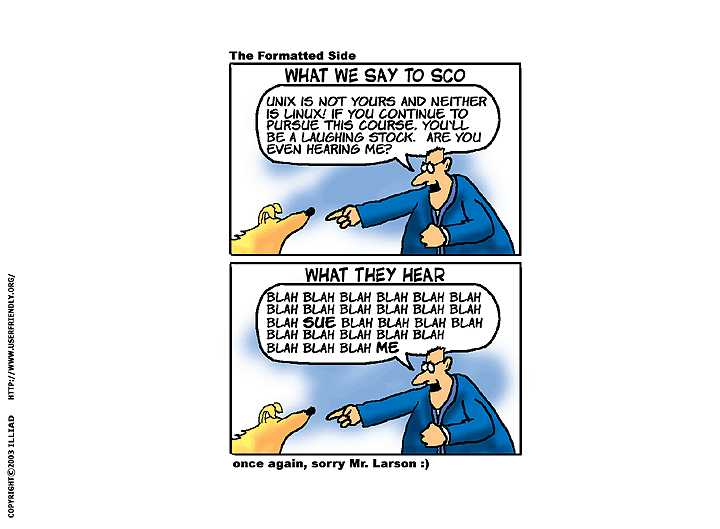Introduction to DMCA (Digital Millennium Copyright Act)
and DRM (Digital Rights Management)
by: Jeffrey Jonas
for Pervasive Computing
June 2003
or ...
THE BLOOD SUCKING LEECHES
ARE OUT TO GET US!



Preface
Most sources concerning the recent copyright laws and software/hardware enforcement
mechanisms are highly biased.
I have mixed feelings about all this.
I'm usually a software consultant, so the software I write is 'work for hire'
and I'd like to think it's worthy of protection.
Yet I use open-source and freeware tools (such as GNU toolkit) to create such tools
and for my home PCs.
But several friends are artists: they are financially hurt when their artwork is copied
or used without permission. They use watermarks, digital watermarks or notices
"Hey! Buy my art without this notice across the front" to discourage unfair-use.
But what of music and video?
This is only a snapshot of the current state
of copyright legislation and proposed enforcement since it's all in flux.
Copyright, patent or trademark?
Most countries (except China) have the concept that those who create useful or desirable
things are entitled to profit from them and have protection from being copied.
Rights are granted and clarified by copyright, patent, trademark and licenses.
COPYRIGHT pertains to original works regardless of medium:
print (book, magazine), movie, sound recording, paintings, performanes, TV shows, etc.
The Berne Convention (
http://www.cerebalaw.com/berne.htm
)
is the foundation for most national copyright laws, which specifies in Article 7:
(1) The term of protection granted by this Convention shall be
the life of the author and fifty years after his death.
(2) However, in the case of cinematographic works, the countries of the Union may provide
that the term of protection shall expire fifty years after the work has been made available
to the public with the consent of the author, or,
failing such an event within fifty years from the making of such a work,
fifty years after the making.
The WIPO: World Intellectual Property Organization (
http://www.wipo.org/)
is an international organization dedicated to promoting the use and protection
of works of the human spirit. These works - intellectual property -
are expanding the bounds of science and technology and enriching the world of the arts.
Through its work, WIPO plays an important role in enhancing the quality
and enjoyment of life, as well as creating real wealth for nations.
PATENTS originally protected machines or devices,
but was recently extended to include software (which was traditionally copyrighted as a printed work).
US Patents last 20 years, or less if they're not renewed.
TRADEMARK protects names and images used to identify a company or its products.
LICENSES to quote
Microsoft
A license is an agreement between the user and the software publisher
which outlines terms of use of a software product.
A software license grants you the legal right to use a piece of software.
For each software program you use, you need a license,
granted to you and documented in the license agreement.
to elaborate ...
Patents are granted after a review process to determine if it's really unique and
worthy of protection. Sadly, many trivial patents have been recently granted
which has hindered several industries (such as the "exclusive-or cursor" patent
which should have been never granted since it was prior-art).
Patents expire in 20 years, but fees must be paid along the way:
according to
http://www.uspto.gov/web/offices/pac/doc/general/mainten.htm
:
All utility patents which issue from applications filed on and after December 12, 1980
are subject to the payment of maintenance fees which must be paid to maintain the patent in force.
These fees are due at 3, 7 and 11 years from the date the patent is granted ...
A google search for "patent expiry" shows much interest in monitoring
when drug patents expire, making them available for generic manufacturing.
See:
http://www.cptech.org/ip/health/aids/unaids.html
Public Domain software makes use of devices whose patents have expired, such as
the GIF format soon being available again.
US trademarks are files with the
U.S. Patent and Trademark Office.
You often hear about trademarks when the holder takes legal action against those
using similar names or logos, often claiming it's intentionally creating
confusion between the companies or products.
"trademark dilution" happens when the trademark is not enforced.
For example:
- "Scotch Tape" is 3m's trademark for adhesive cellophane tape.
- "Band Aid" is Johnson & Johnson's trademark for adhesive bandages
- "Xerox" is a trademark for Xerox Corp's xerograhpic photocopiers
but they're considered common language now.
Intel's "Pentium" is a trademark since you cannot trademark numbers such as 80486.
Intel tried to copyright the letter "i" but can only trademark a particular
artistic expression.
Licenses are country, state and locality specific!
Sadly, most End User License Agreements (EULA) take away user's rights
and try to override copyright laws by restricting how many use it, for how long,
and allow for monitoring and auditing for compliance.
Most of the DRM or DRM-ready software forces you to agree to an EULA
forfeiting your privacy just to download the program.
The Free Software Foundation's
copyleft
does the opposite: it encourages sharing the source and giving rights to those
who use and develop the software.
Copyright is the hot topic of the day.
Think of all the places you see a copyright notice: on newspapers, books,
TV broadcasts, radio broadcasts, web pages too.
Copyrights are supposed to be finite so things eventually become
Public Domain (a good example is
Project Gutenberg) but ...
perpetual copyright is granted in exceptional cases.
-
The British government
granted Sir James Matthew Barrie's Peter Pan
perpetual copyright protection since the royalties benefit a hospital.
-
Mickey Mouse ought to be public domain by now since it's 50 years since
Walt Disney's death, but the Disney corporation has significent political power
and continues to be a major participant
in legislation and technology to make money from their properties.
They were a major backer of the failed "DIVX" system (essentially pay-per-view
for a movie CD), Macrovision distortion of their videotapes,
and will explore DRM systems such as using CDs and DVDs that self-destruct in short time.
Now we finally have the foundation to start understanding DMCA and DRM.
quoting
http://www.educause.edu/issues/dmca.html
The Digital Millennium Copyright Act
The 1998 enactment of the Digital Millennium Copyright Act (DMCA)
represents the most comprehensive reform of United States copyright law in a generation.
The DMCA seeks to update U.S. copyright law for the digital age
in preparation for ratification of the World Intellectual Property Organization (WIPO) treaties.
Key among the topics included in the DMCA are provisions concerning the
circumvention of copyright protection systems, fair use in a digital environment,
and online service provider (OSP) liability
(including details on safe harbors, damages, and "notice and takedown" practices).
DRM (Digital Rights Management): dare I admit that Microsoft has a good definition:
(
http://www.microsoft.com/windows/windowsmedia/wm7/DRM/FAQ.aspx
)
A. Windows Media DRM is an end-to-end digital rights management (DRM) system
that offers content providers and retailers a flexible platform for the secure distribution
of digital media files. Using Windows Media DRM, content owners can now deliver
music, videos, and other digital media content over the Internet in a protected format.
It facilitates consumers to obtain digital media files legitimately
while maintaining the rights of the content owners. ...
To generalize: DRM is hardware and/or software that enforces the DMCA.
now to the meat of it ...
Quoting from today's required class reading:
The Architecture of Privacy
Draft 2. Essay presented at the Taiwan Net '98 conference, in Taipei, March, 1998.
by Lawrence Lessig
There are parts of anyone's life that is monitored
and there is a part that can be searched ...
I see the following structure to DMCA and DRM:
- the laws of the DMCA defines what is copyrighted and how it may be enforced.
- copyright holders have several mechanisms to enforce their copyright
- devices that actively MONITOR access to the content and grant/block access.
- devices that passively SEARCH access or ownership of copyrighted material.
to elaborate:
- legal enforcement of intellectual property consists of LAWSUITS
on the grounds of rights granted by patent, copyright, trade secret,
top secret, NATO secret, etc.
There are trade limits on things too, such as not allowing cryptographic technology
to certain countries (even if in systems/programs such as Linux, Netscape, etc).
- ACTIVE countermeasures include devices that prevent even
viewing the movies or documents.
DRM is the main technology to achieve that.
Circuit City once sold DVD players with "DIVX"
where you had to pay-per-view even though the movies were in the DVD in your possession.
Macrovision and other copy-blockers are used on videotapes.
"you can buy it but you don't OWN it"
Most software won't even install or download until you agree to the EULA
and some track the versions via registration and/or a serial number.
Some software reports your activity even without your consent.
Such spyware is terribly common since it's hard to see when it's happening
and most practitioners justify it as encorcement of their EULA,
or claim it's to help keep prices down by giving additional revenue for
their user's information.
- SEARCHING countermeasures are after the fact, such as the RIAA
reviewing internet traffic to find people trading music, then sueing them
or otherwise harassing them into submission.
Plagurism or copyright infringement is aided by technology such as digital watermarks
(or other information hiding techniques)
so the origin of a document or piece of art can be determined.
Audits of registration or serial numbers, or searching for digital "signatures"
detect conformance to the law, licenses, etc.
I've suffered for my music,
and now it's your turn
-- Eric Idle
LATE BREAKING NEWS
Record industry to sue downloaders
cnn_riaa.html or riaa.txt
Wednesday, June 25, 2003 Posted: 1910 GMT
We will go after the worst offenders first.
-- Carey Sherman, RIAA's president
WASHINGTON (AP) -- The embattled music industry disclosed aggressive plans Wednesday for an unprecedented escalation in its fight against Internet piracy, threatening to sue hundreds of individual computer users who illegally share music files online.
Microsoft and Intel tried to implement and deploy the Palladium system
to enforce copyrights and licensing, but backed off over public outcry
about privacy concerns. The TCPA (Trusted Computing Platform Alliance) is their
next try at that.
But
Orrin Hatch
thinks that's not enough:
http://www.gopusa.com/news/2003/june/0619_hatch_computers.shtml
"WASHINGTON (Talon News) -- Sen. Orrin Hatch (R-UT), chairman of the
Senate Judiciary Committee, has proposed destroying the computers of
those users who illegally download copyright-protected music and
movies over the Internet."
Good morning, Mr. Phelps. ...
this CD will self destruct in 10 seconds.
Tuesday, June 17, 2003 Posted: 1454 GMT
LONDON, England (Reuters) -- If technology firms like Sony and Microsoft have their way,
songs and movies will expire after a single play -- unless you pay the copyright holder their due.
The technology that makes this possible -- known as digital rights management, or DRM
-- will forever change the way we consume media and software, experts believe.
And there's
lots more.
Hush! It's time for the librarians to speak!
Libraries are impacted by the new stricter copyright laws and enforcement mechanisms
since they interfere with the free and unlimited use that they're supposed to offer.
Libraries are caught in the dilemma of adapting to new digital media
yet preventing unfair copying. Even with scanners and photocopiers,
copying large books is still unfeasible. But digital content is intangible.
This is somewhat related since the DRM provides monitoring which could be used
to monitor people, and it shows that libraries and librarians are serious about privacy.
Librarians Use Shredder to Show Opposition to New FBI Powers
Staff members at the nine-branch Santa Cruz Public Library System
used to destroy discarded paperwork as time allowed, typically once a week.
But at a recent meeting of library officials,
it was decided the materials should be shredded daily.
"The basic strategy now is to keep as little historical information as possible,"
said Anne M. Turner, director of the library system.
The move was part of a campaign by the Santa Cruz libraries
to demonstrate their opposition to the USA Patriot Act.
and here's a letter from Eli Edwards, a librarian:
DRM and DMCA: Libraries’ p.o.v.
Overview
Librarians who are also advocates for the public domain are really concerned about DMCA
and other copyright legislation that has appeared over the last decade.
A lot of the new laws do not explicitly recognize first sale and fair use rights
for digital content; first sale (i.e. once a person buys an item of content -- book,
magazine, etc., -- the creator or owner of the copyright for that content no longer dictate
to the buyer what the buyer does with that particular item; thus, people can sell, loan, borrow
or give away the item without the express permission of the copyright holder)
and fair use (exemptions to copyright which allow for content to be used or excerpted for
scholarly, research or educational uses without the express permission of the copyright holder)
are considered two of the bedrock principles that allow public, school, academic
and even some special libraries to operate in the way they do.
What has been granted to libraries to do with digital content in such legislation
is been interpreted as being very limited. Also, a lot of public domain advocates complain
that the newest laws regarding copyright no longer require an intent to pirate;
the action assumes intent. So, except for certain exemptions,
if a library attempts to crack the encryption on a digital container
(e-book, software, digital watermark) for a fair use reason,
the DMCA has been interpreted to see any cracking as an attempt at piracy
and a violation of the law.
Libraries seem to look at DRM and DMCA as two different beasts.
As you know, DMCA is federal legislation that enjoins certain activities
with the threat of criminal penalties.
DRM, in the library world, refers to the various technologies and protocols
that are used to license data from content owners (like Lexis/Nexis and Factiva,
or journal publishers that provide print and/or electronic formats).
Right now, I’d say there might be more librarians concerned with DRM than with DMCA,
because every library that wants to offer electronic resources to their patrons
has to deal with DRM (and patrons want electronic resources!).
And I think that for right now, most librarians think that the publishers/aggregators
(an in-house term for bibliographic database vendors)
have most of the leverage, but there are various libraries that are working on ways
to turn things in their/our favor.
My advisor just gave a paper/presentation talking about how library acquisitions are being
affected by the shift to electronic formats; he didn’t mention DMCA (I don’t think,
but he might have mentioned DRM ... let me check, and ask him
if I can forward his paper to you). Patents and trademarks aren’t dealt with
regularly by libraries, but copyright concerns are their stock in trade.
Here’s some library-related links to information:
ALA’s webpage on all things copyright-related:
http://www.ala.org/Content/NavigationMenu/Our_Association/Offices/ALA_Washington/Issues2/Copyright1/Copyright.htm
ALA’s take on DMCA:
http://www.ala.org/Content/NavigationMenu/Our_Association/Offices/ALA_Washington/Issues2/Copyright1/DMCA__The_Digital_Millenium_Copyright_Act/DMCA__The_Digital_Millenium_Copyright_Act.htm
ALA re: DRM
http://www.ala.org/Content/NavigationMenu/Our_Association/Offices/ALA_Washington/Issues2/Copyright1/Digital_Rights_Management/Digital_Rights_Management.htm
Fair Use Legislation:
http://www.ala.org/Content/NavigationMenu/Our_Association/Offices/ALA_Washington/Issues2/Copyright1/Fair_Use_Legislation/Fair_Use_Legislation.htm
Howard Besser is a pioneer in digital preservation (particularly of art objects) and an expert on information policy. This paper does a really great job of summing up how the changes in copyright legislation affects libraries and the public domain in general:
http://www.gseis.ucla.edu/~howard/Papers/copyright99.html
His website is: http://www.gseis.ucla.edu/~howard/
And if you need more specifics on copyright law, past and present, as applied to libraries:
http://www.librarylaw.com/Copyright_and_Libraries.html
You may well have some public domain advocates that you’re already citing, but here’s a few that I particularly like:
Lawrence Lessig, who argued against the DMCA in front of the Supremes (and lost): http://cyberlaw.stanford.edu/lessig/
Pamela Samuelson: http://www.sims.berkeley.edu/%7Epam/
And this is from a conference on DRM that she organized earlier this year:
http://www.law.berkeley.edu/institutes/bclt/drm/
Edward Felten: http://www.freedom-to-tinker.com/
And of course, there’s EFF: www.eff.org
Copyfight: http://www.copyfight.org/
the RIAA censors more than just music sharing
The DCMA Horror Show
Censorship is real. See the paper and the statement at
http://www.srhea.net/sdmi/sdmimessage.txt
The following statement was read by Edward W. Felten
at the Fourth International Information Hiding Workshop, in Pittsburgh,
on April 26, 2001.
On behalf of the authors of the paper "Reading Between the Lines:
Lessons from the SDMI Challenge," I am disappointed to tell you
that we will not be presenting our paper today.
Our paper was submitted via the normal academic peer-review process.
The reviewers, who were chosen for their scientific reputations and credentials,
enthusiastically recommended the paper for publication,
due to their judgment of the paper's scientific merit.
Nevertheless, the Recording Industry Association of America (RIAA),
the SDMI Foundation, and the Verance Corporation threatened to bring a lawsuit
if we proceeded with our presentation or the publication of our paper.
Threats were made against the authors, against the conference organizers,
and against their respective employers.
Litigation is costly, time-consuming, and uncertain, regardless of the merits
of the other side's case. Ultimately we, the authors, reached a collective decision
not to expose ourselves, our employers,
and the conference organizers to litigation at this time.
We remain committed to free speech and to the value of scientific debate
to our country and the world. We believe that people benefit from
learning the truth about the products they are asked to buy.
We will continue to fight for these values, and for the right to publish our paper.
We look forward to the day when we can present the results of our research to you,
our colleagues, through the normal scientific publication process,
so that you can judge our work for yourselves.


